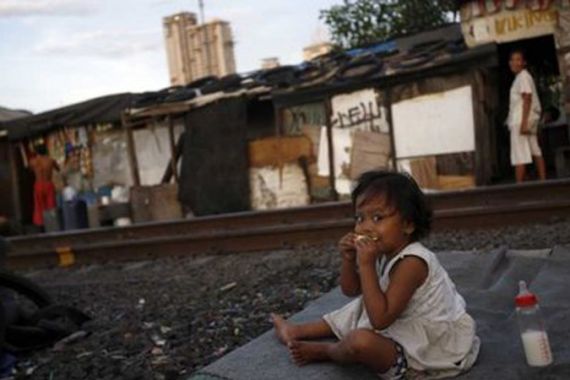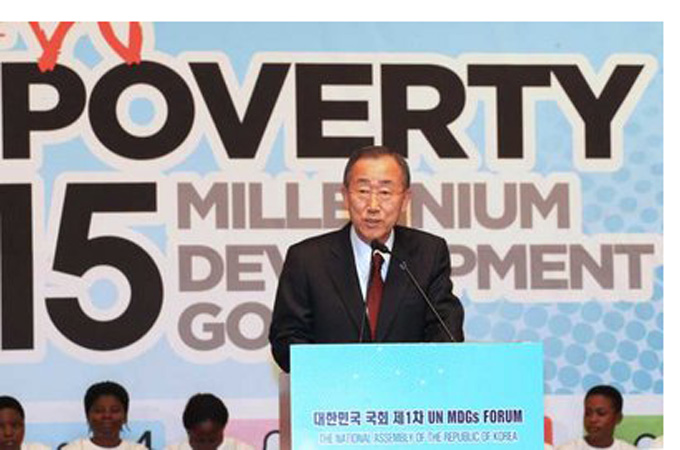Development in an age of economic uncertainty
Today, the world economy is more volatile than ever, endangering recent progress in developing countries.

 |
| UN Secretary General Ban Ki-moon delivers a speech during a UN Millennium Development Goals forum in Seoul [EPA] |
The adoption of the Millennium Development Goals (MDGs) in 2000 marked a significant moment in history that addressed issues of universal human importance. It was a hopeful moment in which there was a global conviction that human deprivation could be alleviated through the coordinated and sustained effort of the world’s nations.
Nearly twelve years later, many countries have indeed made impressive strides towards achieving the MDGs. However, we also now live in a more uncertain and integrated world where economic and financial shocks are more likely than ever, and their impact can be more broadly devastating. With such an environment comes different and profound challenges for human development. To be clear, vulnerability to shocks directly impacts how well households meet basic needs, how many people live in poverty, the access children have to schooling, and the ability of men and women to find meaningful and productive employment.
Keep reading
list of 4 itemsKey takeaways from Xi Jinping’s Europe trip
When will EVs become mainstream in the US?
Key takeaways from Xi Jinping’s European tour to France, Serbia and Hungary
Despite these new challenges, we cannot lose the genuine hope and momentum for progress embodied in the MDGs. Rather, fostering human development now demands that we effectively leverage recent lessons about how such crises affect developing countries and the world’s most vulnerable populations. Only then can we develop and promote policies and programmes that successfully manage vulnerability, build resilience, and thus promote the human development of all people.
Vulnerability of developing countries is not only determined by how integrated they are with the global economy, but is also influenced by levels of income inequality and poverty around the world. Identifying the structural characteristics that influence how developing countries suffer from economic and financial shocks is key to addressing the outstanding impediments to human development. A new report published by the United Nations Development Programme (UNDP), Towards Human Resilience: Sustaining MDG Progress in an Age of Economic Uncertainty, provides us and policymakers around the world with an extensive account of lessons taken from the experience of developing countries over the past 15 years.
Notably, the report shows us that contribution of exports to overall economic activity is greater than previously imagined and increasing sharply in many developing countries, particularly in Africa, the Commonwealth of Independent States (CIS) and among the least developed countries (LDCs). Such dependence on exports to generate revenues and economic growth significantly shapes a country’s vulnerability to economic shocks, particularly when exports are concentrated in a small number of products and directed to only a few trading partners. It’s not surprising, therefore, that countries that also had a high degree of export concentration, such as in Africa and CIS, witnessed the steepest declines in revenues and growth following the most recent global economic and financial crisis.
|
“Inequality has surged in advanced and developing countries over the past two decades.” |
Households in the 95 developing countries, particularly in Africa, the Pacific Islands, and among the LDCs, that are dependent on commodities for at least half of their overall export earnings also live in a highly vulnerable condition. This is because dependence on commodity exports ties these countries, and thus their citizens, to volatile global commodity prices. The uncertainty inherent in this position not only decreases the ability of governments to predict budget revenue and thus expenditure, but also affects the incomes of households that are dependent on commodity production for their livelihoods. Even more disheartening, the long-term decline in real commodity prices has slowly eroded the income of dependent households, many of which are likely to have been already poor, if not impoverished, for generations.
Dependence on foreign aid
The report also finds a particularly worrying trend for developing countries: increasing reliance on foreign capital relative to domestic capital. This is especially true of countries in the CIS and among the LDCs. Moreover, official aid flows constituted a significant portion of the overall economy in many development countries, particularly least-developed countries and small island states. Such aid and foreign investment flows put these countries in a highly precarious position, to the extent that they rely on these to finance overall domestic spending. Indeed, both flows are highly volatile and often decrease markedly during unexpected economic downturns, precisely when they are needed the most to bolster domestic investment, support the overall economy, and finance social and development programmes.
Remarkably, inequality has surged in advanced and developing countries over the past two decades. This trend is troublesome, because rising inequality uniquely contributes to global and domestic economic and financial instability itself by fostering a political environment that lends itself to risky investment behavior and the emergence of asset bubbles. High and persistent levels of inequality also make poverty reduction goals difficult to achieve. In this manner, they create an environment in which policies fostering economic growth and human development are less likely to be implemented, particularly where the institutions of government are weak.
On the other hand, resilience to such shocks depends on the ability of developing countries to engage in countervailing spending and the quality of their institutions and government structures. Chronic and high fiscal and trade deficits in some developing countries limit the ability of governments to engage in the spending needed to cope with and minimise the most harmful effects of shocks. Moreover, existing high debt levels and international restrictions on deficit spending further constrain public spending. Weaknesses in the capacity of institutions and governments are also highly evident among developing countries. Subsequently, many countries have resorted to short-term, ad hoc responses to unexpected economic crisis when a longer-term and effective policy and institutional structure is necessary to foster effective resilience to shocks.
Strong decision making is key to effective implementation
Sustaining MDG progress today thus requires the development and implementation of policies and practices that successfully engage these lessons. Indeed, this report highlights an extensive array of policy recommendations that can be adapted and applied by international policy makers and national governments to minimise susceptibility to unpredictable global economic fluctuations and enhance resilience among development.
For instance, countries can reduce their dependency on exports by recalibrating growth strategies away from a narrow range of exports and by boosting demand from domestic sources. The international community can help reduce the susceptibility of developing countries to volatile commodity prices with the development of new international commodity agreements or funds to compensate countries for the loss in income due to falling prices.
Moreover, national governments could establish programmes to smooth commodity income fluctuations by developing alternative trade initiative, insurance schemes, or revenue stabilisation funds. Similarly, fluctuations in official aid flows could be smoothed through the development of national reserve funds to be used during downturns. Addressing rising income inequalities, on the other hand, would require promotion of inclusive growth, productivity, productive employment, and the redistribution of assets and incomes. Moreover, social protections, access to assets, and securitisation of the rights of the poor need to be promoted to reduce deprivation and enhance the political power and engagement of disadvantaged populations.
With policy recommendations like these to inform the efforts of national governments and the international community, developing countries can build the strong mechanisms needed to meet the profound challenges to human development posed by today’s unpredictable global economy. With an inspired and rigorous effort, we will maintain the hope and advance the progress towards human development embodied in the Millennium Development Goals well into the future.
Selim Jahan is the Director of the Poverty Group at the United Nations Development Programme in New York.
The views expressed in this article are the author’s own and do not necessarily reflect Al Jazeera’s editorial policy.
